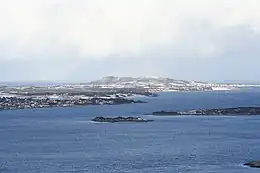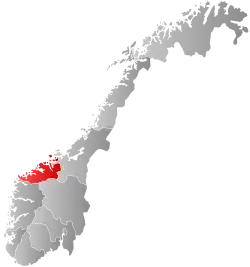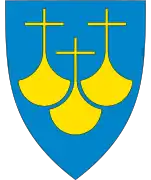Vigra
Vigra is a former municipality in Møre og Romsdal county on the west coast of Norway. The 20-square-kilometre (7.7 sq mi) municipality existed from 1890 until its dissolution in 1964 when it was merged into the present-day Giske Municipality. The former municipality was made up of the island of Vigra along with many smaller islets surrounding it. The administrative centre of the municipality was the village of Roald, and Vigra Church was the main church for the municipality.[2]
Vigra herred
Roald herred (historic) | |
|---|---|
 View of Vigra island | |
 Møre og Romsdal within Norway | |
 Vigra within Møre og Romsdal | |
| Coordinates: 62°33′28″N 06°04′42″E | |
| Country | Norway |
| County | Møre og Romsdal |
| District | Sunnmøre |
| Established | 1 Jan 1890 |
| • Preceded by | Haram Municipality |
| Disestablished | 1 Jan 1964 |
| • Succeeded by | Giske Municipality |
| Administrative centre | Roald |
| Area (upon dissolution) | |
| • Total | 20 km2 (8 sq mi) |
| Population (1964) | |
| • Total | 1,569 |
| • Density | 78/km2 (200/sq mi) |
| Demonym | Vigring[1] |
| Time zone | UTC+01:00 (CET) |
| • Summer (DST) | UTC+02:00 (CEST) |
| ISO 3166 code | NO-1533 |
History
On 1 January 1890, the western islands in Haram Municipality were separated from Haram and established as Roald Municipality. The initial population was 794. In 1911, the name of the municipality was changed to Vigra. During the 1960s, there were many municipal mergers across Norway due to the work of the Schei Committee. On 1 January 1964, the whole municipality of Vigra was merged into the neighboring Giske Municipality. Prior to the merger, the population of the municipality was 1,569.[3]
Name
The municipality was originally named after the old Roald farm (Old Norse: Róǫld) which was likely the original name of the island as well (later the island became known as Vigra). The meaning of the name is unknown. In 1911, the municipality was renamed Vigra, after the main island in the municipality, Vigra (Old Norse: Vigr), since the first Vigra Church was built there. The name is derived from the word vigr which means "spear". It is likely that a peninsula of the island was being compared to the shape of a spear blade.[2][4]
Government
While it existed, this municipality was responsible for primary education (through 10th grade), outpatient health services, senior citizen services, unemployment, social services, zoning, economic development, and municipal roads. During its existence, this municipality was governed by a municipal council of directly elected representatives. The mayor was indirectly elected by a vote of the municipal council.[5]
Municipal council
The municipal council (Heradsstyre) of Vigra was made up of 13 representatives that were elected to four year terms. The party breakdown of the final municipal council was as follows:
| Party Name (in Nynorsk) | Number of representatives | |
|---|---|---|
| Labour Party (Arbeidarpartiet) | 2 | |
| Local List(s) (Lokale lister) | 11 | |
| Total number of members: | 13 | |
| Party Name (in Nynorsk) | Number of representatives | |
|---|---|---|
| Labour Party (Arbeidarpartiet) | 2 | |
| Local List(s) (Lokale lister) | 11 | |
| Total number of members: | 13 | |
| Party Name (in Nynorsk) | Number of representatives | |
|---|---|---|
| Labour Party (Arbeidarpartiet) | 3 | |
| Local List(s) (Lokale lister) | 9 | |
| Total number of members: | 12 | |
| Party Name (in Nynorsk) | Number of representatives | |
|---|---|---|
| Labour Party (Arbeidarpartiet) | 3 | |
| Local List(s) (Lokale lister) | 9 | |
| Total number of members: | 12 | |
| Party Name (in Nynorsk) | Number of representatives | |
|---|---|---|
| Labour Party (Arbeidarpartiet) | 3 | |
| Local List(s) (Lokale lister) | 9 | |
| Total number of members: | 12 | |
| Party Name (in Nynorsk) | Number of representatives | |
|---|---|---|
| Labour Party (Arbeidarpartiet) | 2 | |
| Local List(s) (Lokale lister) | 10 | |
| Total number of members: | 12 | |
| Note: Due to the German occupation of Norway during World War II, no elections were held for new municipal councils until after the war ended in 1945. | ||
Mayors
- 1890–1891: Johannes O. Rørvik (V)
- 1892–1897: Hans Roald (MV)
- 1898–1901: Johan O. Synnes (MV/H)
- 1902–1919: Ole N. Blindheim
- 1920–1922: Johan Roald
- 1923–1928: Olav M. Synnes
- 1929–1931: Ole Jakob Blindheim (V)
- 1932–1935: Olav M. Synnes
- 1935–1941: Andreas K. Roald[13]
- 1941-1945: Knut Gamlem (NS)[13]
- 1945-1948: Salamon H. Røsvik[14]
- 1948–1955: Oskar Stinessen (Ap)
References
- "Navn på steder og personer: Innbyggjarnamn" (in Norwegian). Språkrådet.
- Thorsnæs, Geir, ed. (22 February 2017). "Vigra - kommune". Store norske leksikon (in Norwegian). Kunnskapsforlaget. Retrieved 4 August 2019.
- Jukvam, Dag (1999). "Historisk oversikt over endringer i kommune- og fylkesinndelingen" (PDF) (in Norwegian). Statistisk sentralbyrå. ISBN 9788253746845.
- Rygh, Oluf (1908). Norske gaardnavne: Romsdals amt (in Norwegian) (13 ed.). Kristiania, Norge: W. C. Fabritius & sønners bogtrikkeri. p. 200.
- Hansen, Tore; Vabo, Signy Irene, eds. (20 September 2022). "kommunestyre". Store norske leksikon (in Norwegian). Kunnskapsforlaget. Retrieved 1 January 2023.
- "Kommunevalgene og Ordførervalgene 1959" (PDF) (in Norwegian). Oslo: Statistisk sentralbyrå. 1960. Retrieved 20 April 2020.
- "Kommunevalgene og Ordførervalgene 1955" (PDF) (in Norwegian). Oslo: Statistisk sentralbyrå. 1957. Retrieved 20 April 2020.
- "Kommunevalgene og Ordførervalgene 1951" (PDF) (in Norwegian). Oslo: Statistisk sentralbyrå. 1952. Retrieved 20 April 2020.
- "Kommunevalgene og Ordførervalgene 1947" (PDF) (in Norwegian). Oslo: Statistisk sentralbyrå. 1948. Retrieved 20 April 2020.
- "Kommunevalgene og Ordførervalgene 1945" (PDF) (in Norwegian). Oslo: Statistisk sentralbyrå. 1947. Retrieved 20 April 2020.
- "Kommunevalgene og Ordførervalgene 1937" (PDF) (in Norwegian). Oslo: Statistisk sentralbyrå. 1938. Retrieved 20 April 2020.
- Rogne, M (1937). "Kommunestyringa 1837–1937". Haram og Vigra kommune 1837–1937 (in Norwegian). Ålesund: Sunnmørspostens bok- og aksidenstrykkeri. pp. 20–22.
- "Ordfører". Fylket (in Norwegian). 11 October 1941. p. 2.
- "Ordførar". Sunnmørsposten (in Norwegian). 5 August 1947. p. 4.

